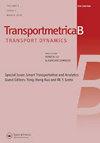Joint optimization of ramp closure, lane reorganization, and signal control strategies for freeway mainline closure owing to construction zones
IF 3.4
2区 工程技术
Q2 TRANSPORTATION
引用次数: 0
Abstract
ABSTRACT This study introduces an innovative bi-level model to address the challenges of managing traffic flow in construction work zones in urban transportation networks. The model integrates ramp closure, lane reorganization, and signal timing strategies within a network-level framework, thereby capturing the interdependencies between these strategies and enhancing the overall performance of the transportation network. The upper level optimizes the ramp closure locations, traffic control timing at signalized intersections and lane reorganization plans, whereas the lower level determines the optimal routing choice and traffic detour based on a Stochastic User Equilibrium (SUE) model. A Genetic Algorithm (GA)-based heuristic method is proposed to solve the optimization problem, and a case study demonstrates the effectiveness of the proposed approach. This study offers a comprehensive and innovative solution to mitigate the negative impacts of detour traffic on urban transportation networks, assist transportation agencies in effectively managing traffic flow and improve the overall system performance.高速公路主干线施工区封闭匝道合流、车道重组与信号控制策略联合优化
本文章由计算机程序翻译,如有差异,请以英文原文为准。
求助全文
约1分钟内获得全文
求助全文
来源期刊

Transportmetrica B-Transport Dynamics
TRANSPORTATION SCIENCE & TECHNOLOGY-
CiteScore
5.00
自引率
21.40%
发文量
53
期刊介绍:
Transportmetrica B is an international journal that aims to bring together contributions of advanced research in understanding and practical experience in handling the dynamic aspects of transport systems and behavior, and hence the sub-title is set as “Transport Dynamics”.
Transport dynamics can be considered from various scales and scopes ranging from dynamics in traffic flow, travel behavior (e.g. learning process), logistics, transport policy, to traffic control. Thus, the journal welcomes research papers that address transport dynamics from a broad perspective, ranging from theoretical studies to empirical analysis of transport systems or behavior based on actual data.
The scope of Transportmetrica B includes, but is not limited to, the following: dynamic traffic assignment, dynamic transit assignment, dynamic activity-based modeling, applications of system dynamics in transport planning, logistics planning and optimization, traffic flow analysis, dynamic programming in transport modeling and optimization, traffic control, land-use and transport dynamics, day-to-day learning process (model and behavioral studies), time-series analysis of transport data and demand, traffic emission modeling, time-dependent transport policy analysis, transportation network reliability and vulnerability, simulation of traffic system and travel behavior, longitudinal analysis of traveler behavior, etc.
 求助内容:
求助内容: 应助结果提醒方式:
应助结果提醒方式:


